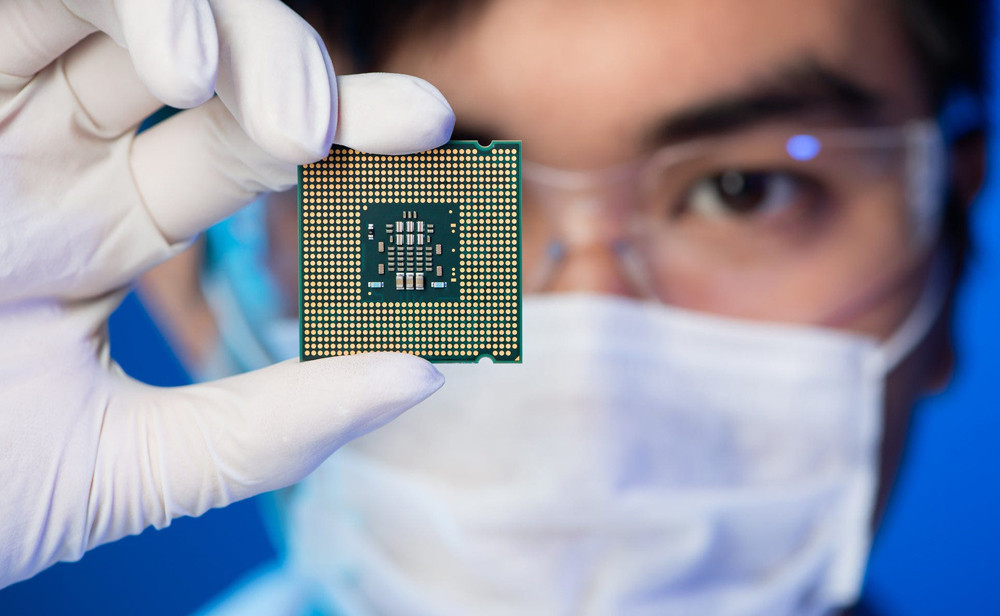Promoting an ecosystem supporting semiconductor chip manufacturing businesses will help Vietnam attract major chip manufacturers.

Four years ago, the Ministry of Information and Communications (MIC) held a seminar on solutions to develop chipset and 5G equipment in Vietnam. Attending were overseas Vietnamese IT experts, ICT firms, associations and researchers at universities.
MIC noted that developing 5G is one of the key directions for improving digital infrastructure and serving national digital transformation. In order to do so, Vietnam needs to master designing and production of chips and 5G equipment.
Nguyen Cuong Hoang, deputy CEO of Viettel High Tech, said the technology firm has over 1,000 IT engineers. Of these, 300 experienced engineers were assigned to the 5G equipment research and manufacturing program.
The technology group approved a budget of VND500 billion for the development of 5G Microcell and is building a 5G lab, worth VND200 billion. Viettel has worked with many partners from the US, South Korea and India in chipset and hardware manufacturing and software for 5G.
“Vietnam never before could make chips from A to Z. When we talked about chipset manufacturing, many experts doubted the feasibility. But just three years later, Viettel really could manufacture chips,” Hoang said.
At the seminar, a representative of FPT noted that it was difficult to manufacture chips and expressed respect to Viettel for doing so within three years.
FPT developed a chip manufacturing plan to be implemented within 10 years. After five years, FPT has over 100 engineers who can design chips.
At first, FPT did not make chips of its own, but made chips for foreign partners.
FPT believes that Vietnam, with 3,000 engineers, is becoming a chip designing hub, and that making chips is within Vietnam’s reach.
No longer a ‘dream’
Three years after MIC organized a seminar, FPT Semiconductor announced the launch of its first microchip model used for IoT products in the field of healthcare, thus turning the dream of manufacturing semiconductor into reality.
FPT Semiconductor engineers designed and set the structure for Integrated Circuits (IC), targeting specific industries and products. The designs completed in Vietnam are outsourced to plants in South Korea where chips are made and packaged.
Its first client, which is now its strategic partner, is now cooperating to distribute FPT Semiconductor’s chip products in Australia and China. FPT Semiconductor also provides chips to domestic companies.
Most recently, FPT Semiconductor signed a strategic cooperation agreement with the US’s Silvaco on developing human resources for the semiconductor industry and doing business in the field. Silvaco, FPT Semiconductor and FPT University have committed to develop human resources for semiconductor companies in the US.
Viettel is also making chips for 5G devices, which only several countries can do. However, it has been cautious about releasing information about chip production.
Vietnam, with two companies (FPT and Viettel) that can manufacture semiconductor chips, has new opportunities to put its name on the map of chip manufacturing.
Nguyen Manh Hung, a lecturer at RMIT University, noted that if Vietnam succeeds in the semiconductor industry, it will be able to ‘squeeze’ into the supply chain of products with high-tech level content, such as telecommunication equipment, computers, healthcare equipment and military equipment.
Vietnam semiconductor center
Many large semiconductor manufacturers have begun seeking partners in Vietnam. Linda Tan from the Southeast Asia Semiconductor Industry Association noted that Vietnam has attracted more and more large corporations from South Korea, Taiwan (China) and the US.
Deputy Minister of Information and Communications Nguyen Huy Dung confirmed that Vietnam wants to become a semiconductor human resources center serving the demand of Vietnam, but also the region and world.
In order to join the semiconductor production chain, Vietnam needs to have a market, huge investments in technology, and good geopolitical relations. The existence of an ecosystem will help increase Vietnam’s appeal to foreign groups.